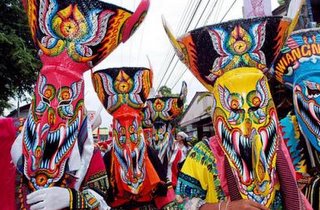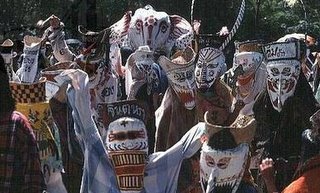Phi Ta Khon - Loei - Thailand
 There is an amazing festival called Phi Ta Khon happening in Thailand next week, as it does every July. Sadly I won't be able to attend as I'll be in Malaysia, but I would dearly love to see this - a sort of Thai Halloween which celebrates the story of the Buddha returning from a long journey and the celebrations being so loud they wakened the dead who joined in the festivities. The festival is celebrated with spectacular spirit masks and ghostly clothing - as you can imagine, the kids love it. The festival is centred around the town of Loei in northern Thailand.
There is an amazing festival called Phi Ta Khon happening in Thailand next week, as it does every July. Sadly I won't be able to attend as I'll be in Malaysia, but I would dearly love to see this - a sort of Thai Halloween which celebrates the story of the Buddha returning from a long journey and the celebrations being so loud they wakened the dead who joined in the festivities. The festival is celebrated with spectacular spirit masks and ghostly clothing - as you can imagine, the kids love it. The festival is centred around the town of Loei in northern Thailand.
Phi Ta Khon is a type of masked procession celebrated on the first day of a three-day Buddist merit-making holiday know in Thai as "Boon Pra Wate". The annual festival takes place in May, June or July at a small town of Dan Sai in the northeastern province of Loei. Phi Ta Khon is held with the arrival of the sixth or seventh lunar month. Young male villagers prepare their ghostly attire and masks, while children roam around town playing tricks. Sheets or blankets are sewn together to look like shrouds while traditional wooden bamboo containers used to store sticky rice (huad), are creatively fashioned into bizarre hats. The huge masks are carved from the bases of coconut trees. The spirit masks are the integral part of the celebrations, which last for three consecutive days.
The first day is marked by a masked procession, accompanied by rejoicing, music and dancing. On the second day, the villagers dance their way to the temple and fire off bamboo rockets to signal the end of the procession. Along the way, they tease onlookers as they accompany a sacred image of the Buddha through the village streets. Monks recite the story of the Buddha's last incarnation before attaining enlightenment.
On the last day of the event, the villagers gather at the local temple, Wat Ponchai, to listen to the message of the thirteen sermons of the Lord Buddha, recited by the local monks. The ghost dancers then put away their ghostly masks and costumes for another year, return to the paddy fields and continue to earn their living with the onset of the new crop season.
